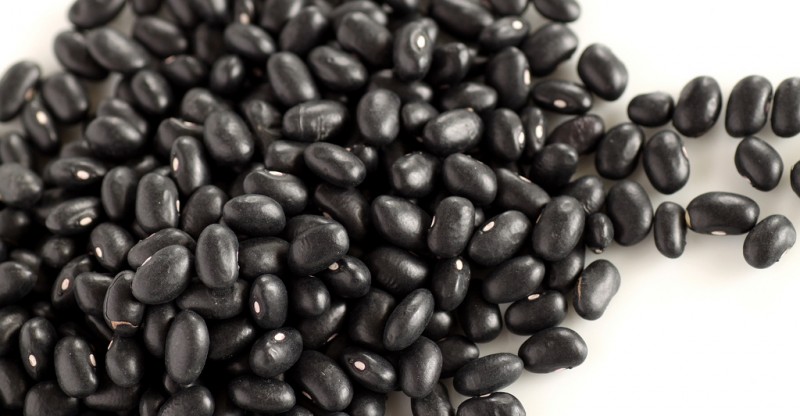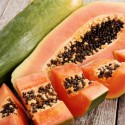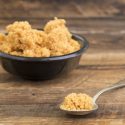Black Beans Nutrition Facts and Health Benefits
Black beans (Phaseolus vulgaris) are commonly known as turtle beans.
This is because of their shiny, dark shell-like look.
They have the taste similar to mushrooms and a smooth texture during cooking.
Technically speaking, black beans are one of the 500 members of the kidney bean family.
This ingredient has been known for various Latin cultures.
As long as 7, 000 years ago, black beans were already considered an important food for Central and South Americans.
These are very common to be found in American cuisines.
Added to that, these are also used for Cajun and Creole cuisines.
Black beans are also common in Mexico, Brazil, Dominica, Cuban and Creole as traditional food.
Whether you are vegetarian or not, black beans can give amazing health benefits for your body.
You can buy black beans either canned or dried.
Black beans are rich in protein, fiber, flavonoid antioxidants, and omega-3 fatty acids are just some of the health benefits they can provide.
The following below are more advantages.
Fiber
Black beans are rich in fiber.
A cup of these beans already contains 15 grams of Fiber.
Soluble Fiber aids our digestive track to work properly and avoid constipation.
On the other hand, the soluble fiber decreases cholesterol and blood-glucose levels.
Foods high in fiber like black beans leave you to feel full longer and avoid craving for too much good because you need to chew them longer.
Lastly, black beans can also help you lose weight.
As I’ve mentioned earlier, soluble fiber decreases your longing for unnecessary eating.
Not only that, fiber has been reported to help decrease your possibility to get cancer diseases like colorectal cancer.
According to a nutritionist, Nancy D. Berkoff, RD, EdD, the amount of fiber you need to consume depends on the calories you intake each day.
For normal adults, the USDA advises 14 grams of fiber to 1 000 calories eaten.
Therefore, if you eat a total amount of 3,000 calories for the day, you should complement it with 42 grams of fiber.
Antioxidants
There is a wide variety of antioxidants that can be found in our nature and give benefits to different parts of our body.
One of the foods rich in antioxidant is the black beans.
The low amount of phytohemagglutinin found in black beans is similar to apples and grapes.
Antioxidants help in balancing cell-damaging free radicals.
Added to that, foods rich in antioxidants lower the risk of heart diseases and different types of cancer.
But as of now, there still studies going on the major benefits of anti-oxidants.
The body may have its own type of antioxidants which are called as endogenous antioxidants.
But despite that, our body still depends on resources from outside specifically from what we eat to be able to get the rest of the antioxidants it needs.
Antioxidants such as vitamins A, C and E, polyphenols and other particular minerals like selenium improves our immune system.
It can prevent a person from having HIV infection.
A study last October 2012 have shown that Vitamin C can help prevent breast cancer among women.
Antioxidants can also provide anti-aging effects.
A link between antioxidants and delaying the aging process and symptoms like memory loss have been found during
Protein
Black beans are also rich in protein.
This is the reason why vegans love to add these to their meals.
Compared to lean meat, protein in black beans have a minute amount of saturated fat and contains zero cholesterol.
If you don’t eat meat, Black beans and rice are a good combination.
If you are planning to bulk up, you should know that protein can increase your muscle mass and lean tissue.
On the other hand, if you want to lose fat, it is easier to do if you have the right amount of protein intake every day.
According to the U.S. Department of Health and Human Services, teenage boys are recommended to consume seven ounces or three servings of protein each day.
For kids from 2 to 6 years old, 2 daily servings or five ounces is enough.
For older children, teenage girls and active women, it is advised to take 2 daily servings with a total amount of 6 ounces.
Amino Acids and Molybdenum
Because black beans are rich in amino acids and molybdenum, these can help our nervous system to function well.
The specific vitamin that can be found in black beans is called as Folate which is also known as Vitamin B9.
This type of amino acid has a major part in regulating particular amino acids that our nervous system needs.
Without Vitamin B9, individuals will develop neurodegenerative conditions such as Alzheimer’s disease and Parkinson’s disease.
Added to that, Molybdenum has been linked to the better functioning of 7 enzymes in our body and various body systems as well.
Lastly, studies have shown that regular intake of this mineral can decrease impotence and erectile dysfunction for older men.
Vitamin B1
Vitamin B1 or thiamin promotes energy production.
Black beans are great for people with Vitamin B1 deficiency to avoid concerns of the nervous system, the heart, and the digestive system.
Another main role of Vitamin B1 is its support to our Nervous System.
With Vitamin B1, structure and integrity of cells in our brain are healthy.
In this case, it prevents brain damages especially with young children who have developing brains.
Healthy Bones
The black beans contain a high amount of iron, phosphorous, calcium, magnesium, manganese, copper and zinc which all promote structuring and keeping our bone structure.
Both calcium and phosphorus are significant for the framework of our bones.
On the other hand, iron and zinc play major roles in keeping our bones healthy and stretchable in particular ways.
Magnesium plays an important role in protein synthesis, nerve function, blood sugar control, neurotransmitter release, blood pressure regulation and energy metabolism.
Iron improves oxygen support throughout our body.
This is by delivering red blood cells with components of hemoglobin which is the ideal transporter of oxygen.
A normal man has around 2 grams of iron and a woman has about 1.6 gm.
If a person consumes less than the standard amount, the capability of our body to endure intense workouts will decrease.
Added to that, the decrease of blood count in our body will lead to decay of important nutrients like Vitamin B12, Folate, Copper and Vitamin A.
Blood Sugar Regulation
With the combination of protein and fiber found in black beans, it helps in balancing blood sugar level.
Compared with other dietary sugar, protein and fiber move at a moderate speed.
This results in the stable movement of our digestive track which makes it simpler to break food components.
This prevents sudden blood sugar increase.
In terms of Diabetes type II, studies have shown that black beans can decrease the activity of alpha-amylase enzymes in our body.
Prevention of Heart Conditions
Fiber, potassium, folate, vitamin B6 and phytonutrient content found in black beans result to a decreased risk in obtaining too much cholesterol in blood sugar which prevents getting heart disease.
Both the Vitamin B6 and Folate ward off the growth of homocysteine.
Too much intake of homocysteine can harm blood vessels which eventually leads to heart diseases.
On the other hand, the quercetin and saponins components help in protecting our heart.
Quercetin is an anti-inflammatory component which lowers the risk of getting atherosclerosis as well as safeguard the harms from LDL cholesterol.
Added to that, the study has shown that saponins have the capability to reduce blood lipid and cholesterol levels in our body.
Improvement of Digestion
As I’ve mentioned earlier, black beans are rich in fiber which boost digestion by maintaining the digestive track toxin-free.
Added to that, fiber is like the broom of the digestive track which sweeps away all the waste to prevent imbalanced bacteria in our gut flora.
It also prevents digestive conditions like constipation, IBS and a lot more.
Different researchers have proven that fiber has the capability to prevent colon cancer because of blockage.
Added to that, fiber also keeps the body’s regular pH level which results in a balanced level of acid and alkaline.
It tackles the heighten level of acid from food like lean meat, processed products, and dairy products.
Weight Reduction
The overall composition of black beans has only a traceable amount of calories which is important if you are trying to lose weight.
Eating black beans can prevent you from eating too much because of the fiber expanding your digestive tracking and soaking up water.
This will prevent you from having too many food cravings of sweets and unnecessary snacks in a day.
Ways to Eat Black Beans
Unlike other nutritional foods, black beans can be bought all year-round.
If you are planning to buy the canned black beans, make it sure to choose products which don’t have sodium and thoroughly drain and rinse these beans to remove sodium content.
If you are preparing dried black beans, it is significant to remove minute debris with the package and wash and soak these beans with clean water approximately eight to ten hours prior to cooking.
This will help in getting a tastier flavor.
You don’t need to eat a bowl of black beans to get the nutrients that you need. There are other ways to be able to include black beans in your daily intake.
These are:
- Soups – Black beans are added to soups for thickening. Who likes watery soup, anyway? You can add one can of black beans to make your soup creamier, healthier and tastier.
- Dip – Black beans can also be eaten as a snack. You can make a simple Mexican dip with black beans added with guacamole, tomatoes, some chopped onions, and cilantro.
- Side Dish – If you feel like you’ve been eating the same main dish every day, add some black beans as a new side dish.
- Burger – Not all burgers are unhealthy especially this black bean burger. You can lessen lean meat and add more the black beans to it.
- Breakfast – Breakfast is the most important meal of the day. If you want lots of energy for the day, add beans to your sunny side up.
- Salad – Black beans can also be added to your regular salad. Just make sure to properly cook the beans before mixing it with other ingredients.
Potential Health Risks of Eating Black Beans
Like some other foods, consuming too much black beans can promote health consequences.
All legumes have galactans, the complex sugar which is difficult for our stomach to digest.
In other words, if you consume too much, you might get intestinal gas and stomach ache.
Black beans also contain purines.
Excessive consumption of this component can result in health concerns such as gout and formation of kidney stones.
Aside from black beans, you should minimize or balance eating foods rich in purine.
Conclusion
Like any other food, black beans can also be important for our well-being.
We discovered that these tiny little beans provide great health benefits like helping our digestive tract to function well, lowering the risk of getting diseases like cancer, diabetes, health conditions and unhealthy bones, maintaining balanced components of our body and even reducing weight.
Anyone can benefit from eating the right amount of black beans.
Whether you are a child, a teenager, an average person or an elderly, surely you will get something great from consuming black beans.
There are many ways to cook black beans and there are thousands of recipes available online and on published books as well.
Just make sure to thoroughly clean this ingredient before adding to your meal.
This ingredient is an excellent choice for people who want to keep themselves and their family healthy.
Indeed, black beans are very popular for their benefits to human-beings and being an amazing addition to dull meals.
FDA Compliance
The information on this website has not been evaluated by the Food & Drug Administration or any other medical body. We do not aim to diagnose, treat, cure or prevent any illness or disease. Information is shared for educational purposes only. You must consult your doctor before acting on any content on this website, especially if you are pregnant, nursing, taking medication, or have a medical condition.
HOW WOULD YOU RATE THIS ARTICLE?







I’m diabetic and try to eat more fiber and proteins as my doctor tells me to do. I want to say that beans are a great choice for diabetes patients, I eat them several times a week and this helps me in controlling my sugar level.
Thank you for sharing valuable information!
Is it necessary to soak beans before cooking them? And for how long and where must be beans stored? Should I put them into the fridge? Thanks!
What way of cooking is the best for preserving beans benefits? I also enjoy even canned beans but are they healthy at all?
I would like to freeze beans. Should i do it before cooking or maybe it’s better after?
Unfortunately, I’m prone to bloating. Should I avoid black beans or I can eat them from time to time? What is it better to consume beans with?
Dried beans will keep for years if properly contained. No need to freeze if uncooked.
So, if beans are so high in protein, they can help me build muscles? How much and how many times per week should I consume them?
I have kidney stones, does it mean I can’t eat beans at all? If I eat them moderately once in a while, wouldn’t this worsen my condition?